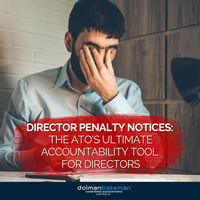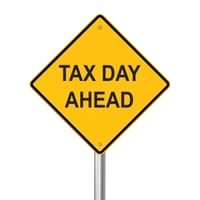PAYG (Pay As You Go) instalments are prepayments of tax made by businesses and individuals to the...
Accrued Director Fees
 Back in the latter half of 2011 to early 2012 the issue of accrued director fees was popular to talk about as the ATO released a taxpayer alert warning against the misuse of this deduction. It wasn’t a new issue, so why was there the sudden interest? We’d like to put a retrospective on this and explore what it was about and why the ATO issued the taxpayer alert and most importantly, to help remind people out there the proper way to carry out this out.
Back in the latter half of 2011 to early 2012 the issue of accrued director fees was popular to talk about as the ATO released a taxpayer alert warning against the misuse of this deduction. It wasn’t a new issue, so why was there the sudden interest? We’d like to put a retrospective on this and explore what it was about and why the ATO issued the taxpayer alert and most importantly, to help remind people out there the proper way to carry out this out.
So what is accrued director fees all about?
This is when you delay the actual payment of the directors’ fees to a following income year. There are a few advantages in doing this and some of these are:
- A tax deduction is entitled to be claimed in the year the accounts were accrued if the company is definitely committed to the payment
- The director is not required to include this accrued payment in their assessable income until it is actually paid (i.e. the following income year)
- The company is not required to remit PAYG withholding until it is actually paid
In order to claim a deduction it must be able to demonstrate this and if the fees were actually incurred. The term ‘definitely committed’ refers to the company making a resolution on or before the 30th of June to make a payment.
Doing this is all perfectly legal and the ATO supports it with its Income Tax Ruling 2534. What was all the fuss about?
The ATO were concerned that some companies were using this as a way to keep claiming deductions despite not having any intention at all to pay the directors’ fees in its full amount. This wasn’t a new issue but the ATO likely encountered an increase in the amount of cases that were involved in this practice. This triggered the release of Taxpayer Alert TA 2011/4 which aimed to clarify their position and to serve as a warning as there will be further scrutiny. TA 2011/4 applies to arrangements with the following features:
- Prior to 30 June of an income year, a directors meeting of a private company is held to consider the remuneration of the directors for that year.
- The meeting resolves that directors fees of a specific amount be made payable to the directors of the company and the minutes reflect that the company is immediately, definitively and irrevocably committed to the liability in respect of these directors’ fees.
- The meeting qualifies this resolution by further resolving that the directors fees be paid at a time to be determined having regard to future cash flow and that amounts be held in a directors fees payable account until payment is or can be made.
- The company claims a deduction for the directors’ fees in the year of resolution but makes no payment to directors.
- The directors do not include any amount in their assessable income until such time as the company pays an amount to them.
- In the following year, the company makes nil or minimal payments to directors despite the company declaring profits and, in some instances, making loans to the director(s).
- This practice may continue in later income years.
This essentially means that the ATO is only targeting those who are claiming the deduction but have no intention of paying the directors’ fees or only expecting to make a part payment.
Also contained in TA 2011/4 is this statement:
“The ATO is not concerned with normal business practice where a company passes a resolution that creates an unconditional commitment to pay directors fees and the payment occurs within a reasonable time period which could extend outside the immediate year of income.”
The line ‘reasonable time period’ has caused some debate as there is no guidance on what the ATO considers a reasonable time period. The common interpretation is that the company has until the 30th of September of the following income year to pay the directors’ fees, i.e. if fees were accrued in June 2013, the ATO will expect it to be paid by the 30th of September 2013.
The last thing that must not be forgotten is if you accrue directors’ fees, you must have your accountant/bookkeeper make Journal Entries.
| Here are the entries when you’re first entering it. | ||
| Directors’ fees (P&L) | DR | |
| Accrued salary payable (Balance Sheet) | CR | |
| These are the entries you make when reversing it | ||
| Accrued salary payable | DR | |
| Directors’ loan account | CR | |
| PAYG withholding liability | CR |



